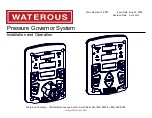
020585.02
13
vetus®
Operation manual and installation instructions bow thruster BOW2512EI 'Ignition Protected'
1
Introduction
These installation instructions give guidelines for fitting the Vetus
bow thruster ‘BOW2512EI - Ignition Protected’.
The quality of installation will determine how reliably the bow thrust-
er performs. Almost all faults can be traced back to errors or impreci-
sion during installation. It is therefore imperative that the steps given
in the installation instructions are followed in full during the installa-
tion process and checked afterwards.
Alterations made to the bow thruster by the user will void any li-
ability on the part of the manufacturer for any damages that may
result.
The thrust given by the bow thruster will vary from vessel to vessel
depending on the effect of the wind, the water displacement and the
shape of the underwater hull.
The nominal thrust quoted can only be achieved under the most fa-
vourable conditions:
• Make sure that the batteries are supplying the correct voltage dur-
ing use
• During the installation process the
‘Installation recommenda-
tions for bow thrusters’
, must be followed, specifically concern-
ing:
- Sufficiently large diameter of the battery cables so that voltage
drop is reduced to a minimum.
- The manner in which the tunnel has been connected to the
hull.
- Use of bars in the tunnel openings.
These bars should only be used where this is strictly necessary
(if sailing regularly in severely polluted water.)
- The bars must have been fitted correctly.
Following the above recommendations will result in longer life and
better performance of your bow thruster.
• For maintenance, please consult the ‘Maintenance and Warranty
Book’ supplied. Art. code 020901.01.
• Never allow the bow thruster to operate for a long period; the
maximum length of usage is restricted because of heat release in
the electric motor. After use the motor must be allowed to cool off.
n
ote
The maximum continuous length of usage and the thrust as
specified in the technical details are based on the recommend-
ed battery capacities and battery cables.
If significantly larger batteries in combination with very short
battery cables of significantly larger diameter than recom-
mended are used then the thrust will increase. In such cases
the maximum length of usage must be reduced in order to
prevent damage to the motor.
2
Safety
W
arning
!
When using the bow thruster watch out for swimmers or light
boats which could be in the near vicinity of the bow thruster tun-
nel openings.
Pass on the safety instructions to others using the bow thruster.
General rules and laws with regard to safety and accident-prevention
also need to be applied.
• Never touch the moving ends of the bow thruster whilst in opera-
tion.
• Never touch hot parts of the bow thruster and never place flam-
mable materials in the vicinity of the bow thruster.
• Always stop the bow thruster before checking components or ad-
justing the bow thruster.
• Always disconnect the battery terminals during maintenance
work.
• Ensure maintenance work is safe by only using tools suitable for
the purpose.
• Always deactivate the main switch when the bow thruster is not in
use for long periods.
3
Use
• Switch on the main switch.
• Consult the handbook supplied with the control panels for in-
structions on using the bow thruster.
Never switch in one movement from starboard to portside or
reverse, but wait until the propeller stands still, before giving
it a command to operate the electric motor in the opposite di-
rection.
c
are
!
If 2 control panels are installed never operate the bow thruster
from both panels simultaneously.
• Switch off the main switch when leaving the ship.
• Keep in mind that the carbon brushes in the motor release fine
(black) dust. Do not store fragile equipment near the bow thruster
motor.
Make sure that the user of the vessel is supplied with the owner’s manual.
ENGLISH














































